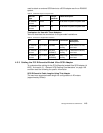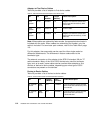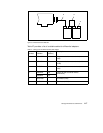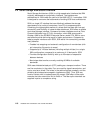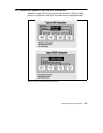
118 RS/6000 43P 7043 Models 150 and 260 Handbook
4.4 Serial Storage Architecture Overview
Serial Storage Architecture (SSA) is a high-speed serial interface that IBM
originally developed as a proprietary interface. The interface was
standardized in 1994 under the control of the ANSI X3T10.1 committee. SSA
is designed to overcome the bottlenecks of existing SCSI bus architectures.
SSA is a single I/O interface that can effectively address the storage
requirements of a variety of computers, from PCs to supercomputers.
Combining the highest performance of a direct disk interface with low cost
connectivity and flexibility of network-wide attachment, SSA offers a reliable
and robust storage interface. Compared to newer interfaces such as Fibre
Channel-Arbitrated Loop (FC-AL) connection, which IBM announced in
October 1998 for the RS/6000 Enterprise Server model S7A, SSA is more
cost-effective while delivering equal or better performance. Compared to
today’s parallel interfaces such SCSI, SSA serial link connectivity provides
many benefits:
• Enables hot-swapping and automatic configuration of new devices (with
out interrupting file service to users)
• Supports up to 128 total devices (including multiple initiator) in a single
SSA configuration, compared to a maximum of 16 devices for SCSI
• Provides configuration flexibility with up to 25 meters of separation
between devices
• Maximizes data transfer, currently enabling 80 MB/s of available
bandwidth
SSA uses shielded twisted pair (STP) cabling as a transport medium. There
are five conductors in the cable. Four are used for signal transmission, and
one is used as a shield. The twists in the cable eliminate crosstalk, and the
shielding eliminates electromagnetic interference (EMI). Thus, SSA can
function reliably with its nodes placed 25 m apart. IBM offers a fiber optic
extender that can extend this limit to 2400 m. The fiber optic extenders are
supplied in pairs to complete a string.






